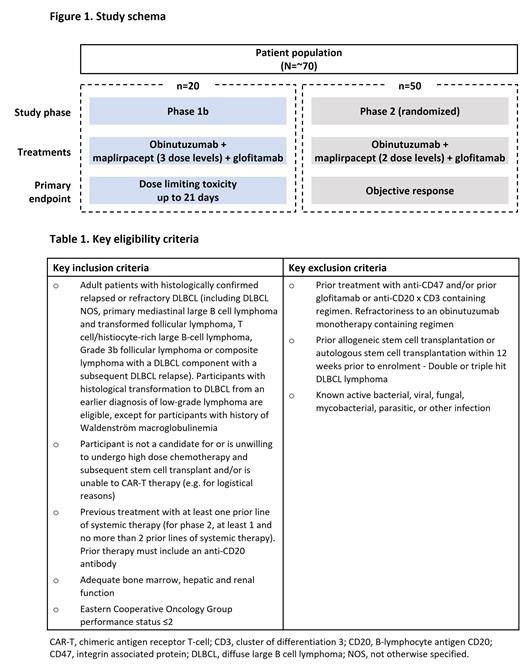Background
Maplirpacept (PF-07901801) is an anti-CD47 fusion protein constructed to enhance phagocytosis and antitumor activity via inhibition of CD47-mediated signaling. Maplirpacept is currently being investigated in an ongoing Phase 1, multi-center, 1a/1b study in participants with advanced hematologic malignancies (NCT03530683). Early safety and efficacy results for maplirpacept monotherapy have previously been reported in patients with refractory or relapsed lymphomas (Patel et al. Blood 2021;138:3560).
Study Design
This trial is a multicenter, open-label, Phase 1b/2 study (NCT05896163), to evaluate the effects of maplirpacept in combination with fixed doses of glofitamab, after a single dose of obinutuzumab, in patients with relapsed or refractory diffuse large B-cell lymphoma (DLBCL). The estimated enrollment is 70 patients; the study will be split into 2 parts (Figure 1). Phase 1b will determine the maximum tolerated dose of maplirpacept, with fixed doses of glofitamab and obinutuzumab. In Phase 2, participants will be randomized to low or high doses of maplirpacept, with fixed doses of glofitamab and obinutuzumab, consistent with the FDA ‘Project Optimus’ initiative for dose optimization and selection in oncology drug development.
Study interventions will be given intravenously in 21-day cycles. At Cycle 0, participants will receive a single pre-treatment dose of obinutuzumab followed by 2 step-up doses of glofitamab. The combination of maplirpacept with full dose glofitamab will be given at Cycle 1 Day 1. Maplirpacept will be given weekly for the first 3 cycles, then every 3 weeks. Glofitamab will be given every 3 weeks for up to 11 cycles. Subsequently, participants will continue to receive maplirpacept alone.
In Phase 1b, participants will be allocated to sequential doses of maplirpacept, given with fixed doses of glofitamab, after 1 dose of obinutuzumab, to select doses of maplirpacept for further evaluation. The primary endpoint for Phase 1b is to assess dose limiting toxicities up to 21 days following the first dose. In Phase 2, participants will be randomized to 2 different doses of maplirpacept, administered with fixed doses of glofitamab, after 1 dose of obinutuzumab. The primary endpoint for Phase 2 is objective response as per the Lugano 2014 response criteria.
Secondary endpoints include frequency of adverse events and clinical laboratory abnormalities, objective response (Phase 1b only), duration of response, complete response, duration of complete response, progression free survival, serum concentration vs time for maplirpacept and glofitamab, and immunogenicity of maplirpacept and glofitamab.
Adult patients with histologically confirmed relapsed or refractory DLBCL (including DLBCL NOS, primary mediastinal large B cell lymphoma and transformed follicular lymphoma, T cell/histiocyte-rich large B-cell lymphoma, Grade 3b follicular lymphoma or composite lymphoma with a DLBCL component with a subsequent DLBCL relapse), will be eligible (Table 1). Participants with histological transformation to DLBCL from an earlier diagnosis of low-grade lymphoma are eligible, except for participants with history of Waldenström macroglobulinemia. Treatment with at least 1 prior line of anti-CD20 antibody-based therapy will be included. For Phase 2, no more than 2 prior lines of systemic therapy will be permitted. Patients who are not candidates for, or who are unwilling to undergo high dose chemotherapy and subsequent stem cell transplant and/or are unable or unwilling to receive chimeric antigen receptor T-cell therapy (e.g. for logistical reasons) will be eligible. All patients should have adequate bone marrow, hepatic, and renal function (eGFR ≥45 mL/min) and ECOG performance status ≤2.
Exclusion criteria include prior treatment with an anti-CD47 agent, prior anti-CD20xCD3 containing regimen, refractoriness to an obinutuzumab monotherapy containing regimen, prior allogeneic stem cell transplantation or autologous stem cell transplantation within 12 weeks prior to enrolment, high grade B-cell lymphoma with BCL2 and Myc rearrangement, active bacterial, viral, fungal, mycobacterial, parasitic, or other infection.
Disclosures
Luscan:Pfizer Inc: Current Employment, Current holder of stock options in a privately-held company. Paccagnella:Pfizer Inc: Current Employment, Current holder of stock options in a privately-held company. Patel:Xencor: Consultancy, Research Funding; Trillium Therapeutics/Pfizer: Consultancy, Research Funding; TG Therapeutics: Consultancy, Speakers Bureau; Sunesis Pharmaceuticals: Research Funding; Pharmacyclics/Janssen: Consultancy, Research Funding; Nurix: Research Funding; Morphosys: Consultancy; Merck: Consultancy, Research Funding; Epizyme: Consultancy, Research Funding; Curis, Inc: Research Funding; CRISPR Therapeutics: Research Funding; MEI Pharma: Consultancy, Research Funding; Loxo Oncology: Consultancy, Research Funding; Kite: Consultancy, Research Funding, Speakers Bureau; Genentech/Roche: Consultancy, Research Funding; Fate Therapeutics: Research Funding; Adaptive Biotechnologies: Research Funding; Caribou Biosciences: Consultancy; Bristol Myers Squibb: Consultancy, Research Funding, Speakers Bureau; BeiGene: Consultancy; AstraZeneca: Consultancy, Research Funding, Speakers Bureau; ADC Therapeutics: Consultancy; Abbvie: Consultancy.


This feature is available to Subscribers Only
Sign In or Create an Account Close Modal